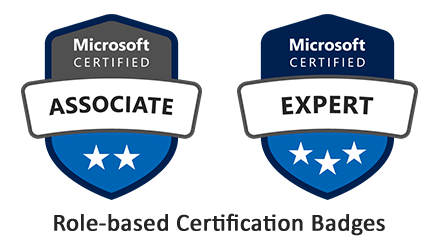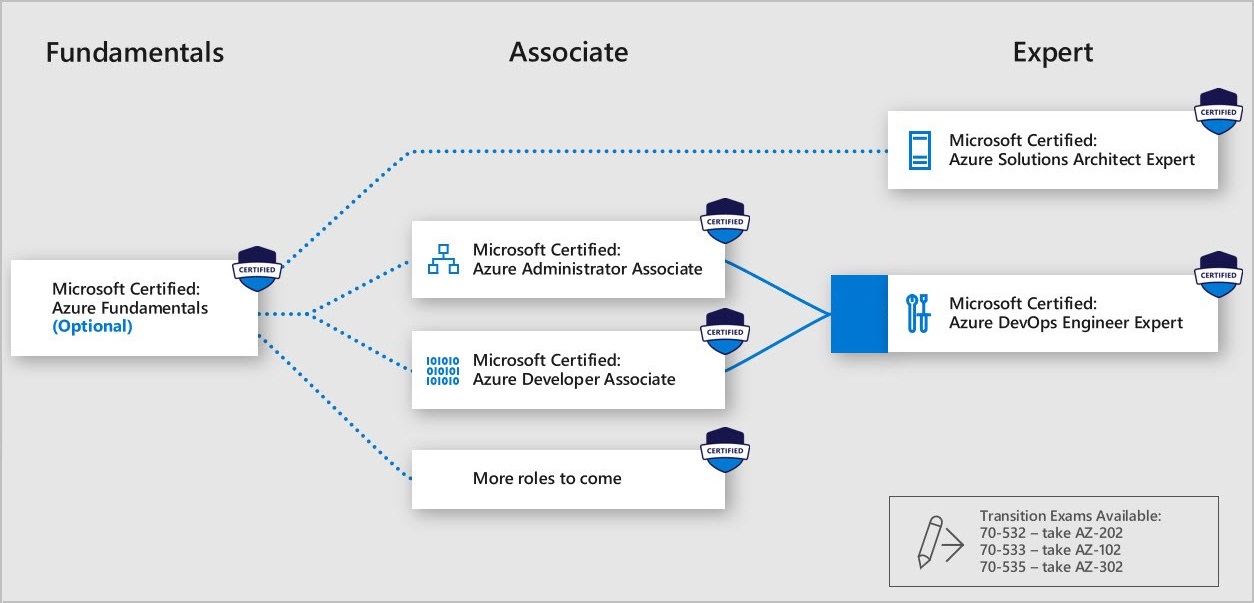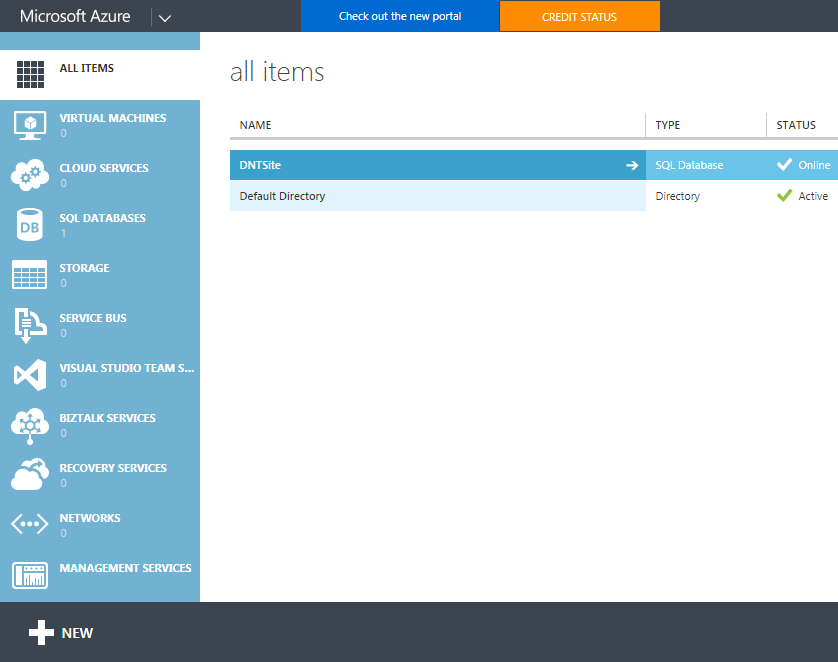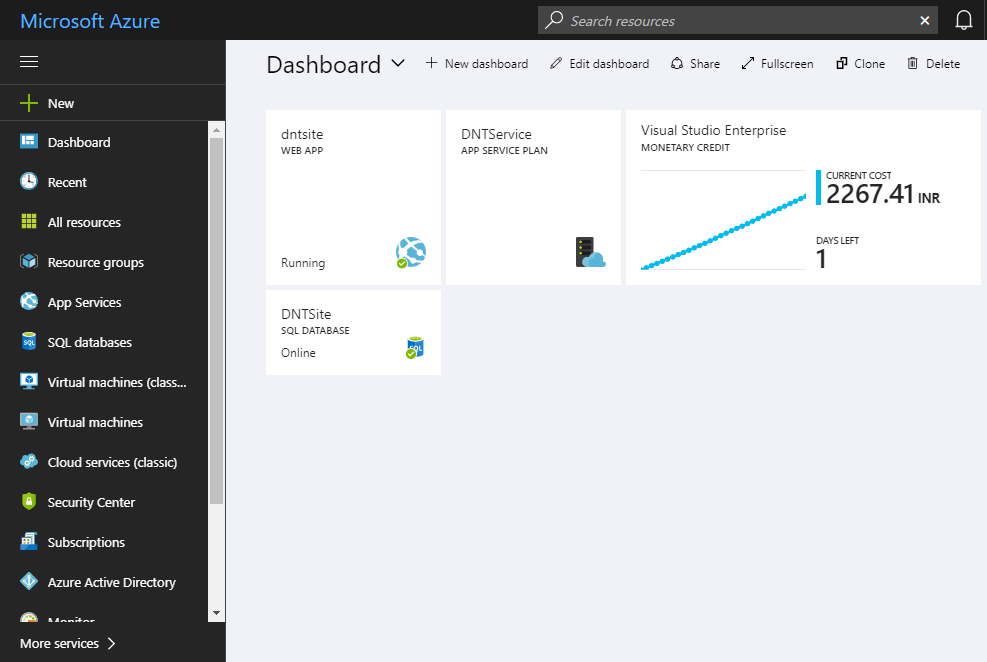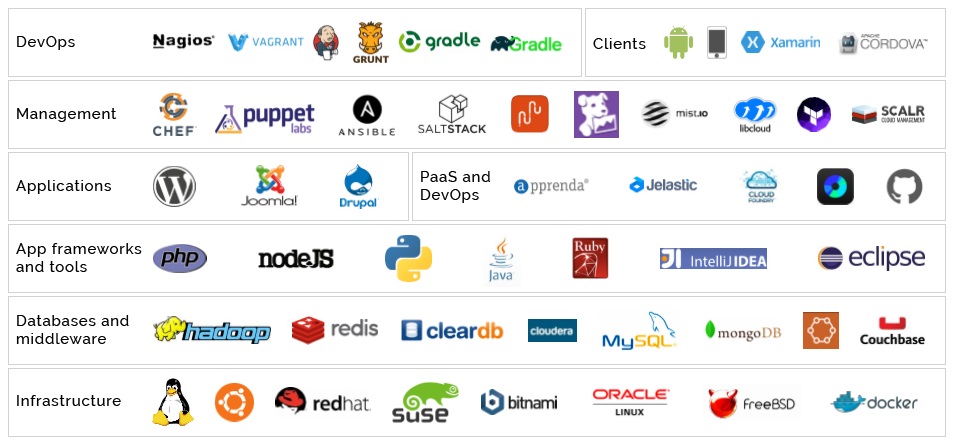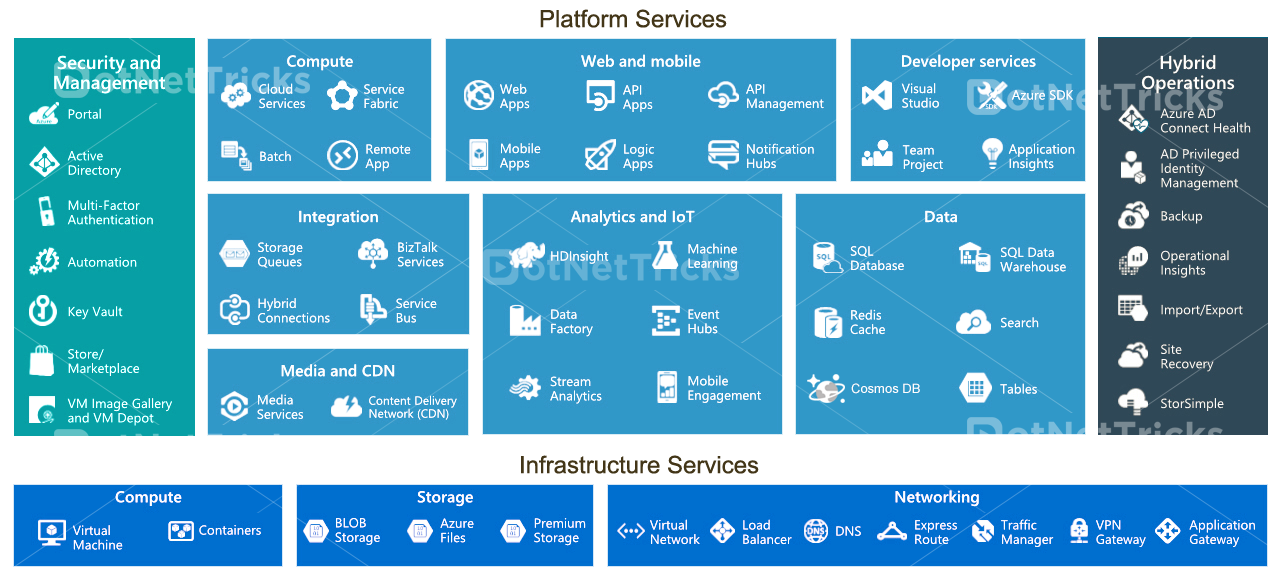The technology industry is booming with each passing day. Cloud computing solutions are being adopted by plenty of organizations for their businesses. Adopted by a huge number of Fortune 500 companies, Microsoft Azure is known as the second-largest Cloud computing service. Azure provides users with access to data storage and a broad range of services comprising of managing and transforming data. It assists businesses to share crucial information, systematizing data, and surmounting challenges.
One of the finest approaches to boost your IT career is to obtain a Microsoft Azure Certification. These certifications prove to be useful for different job roles like IT professionals, software developers, analysts, database administrators, etc. They demonstrate your skills in the Microsoft Azure domain and enhance your odds of getting recruited. After you obtain a suitable Microsoft Azure certification, you can effectively build a career in Microsoft Azure domain, based on your proficiency.
Firstly, the following article familiarizes you with the meaning of Microsoft Azure certifications and the reason to obtain them. The later section discusses how you can build a career with these certifications:
What are Microsoft Azure Certifications
Various companies are on the lookout for experts in the Cloud computing domain. The reason for the increasing demand for Cloud professionals is that a lot of IT organizations have either migrated their on-premise infrastructure to the cloud or deployed a hybrid system owing to the advantages they can obtain from networking, computing, and storage.
In the Cloud market, Microsoft certification is one of the greatest demanding certifications. If you possess any of the Microsoft Azure certifications, you get the privilege of pursuing a broad range of career options like an Azure Administrator, Azure Solutions Architect, Azure Solution Developer, Azure Security Engineer, and more.
Being Azure certified is an outstanding way to advance your career in the IT field. With the widespread usage and needs of Cloud-enabled solutions, Azure certified professionals are in high demand. Therefore, Microsoft Azure certifications are quite popular. Earning any of these certifications validates that you are keeping pace with the technical roles and requisites of today’s era.
Microsoft Azure Certifications support ongoing skill development because Azure is big, powerful, and complex. Hence, once you have achieved any of the Azure certifications, your learning must not hamper. Keep in mind that the Cloud computing domain is always incorporating new changes.
Now let’s look at the list of various reasons to attain a Microsoft Azure certification:
- Quick Process Learning
- Career flexibility
- Continuous career development
- Offering for structured learning and security
- Includes learning for Microsoft Azure Security Technologies
- Assume the role of an important asset.
- Cost-effectiveness
- Pay increases and admirable salaries
- Enhanced security offerings
- Easy-to-use learning tools
- Unparalleled Hybrid competencies
- Seamless integration with .NET platform
Build a career with Microsoft Azure Fundamentals-Level Certifications
Microsoft Azure Fundamentals Certification offers knowledge on the fundamental cloud concepts and services. It emphasizes topics like security, privacy, compliance, and essential technologies. This certification is useful to prepare for other Azure role-based or specialty certifications. Though it is not a prerequisite for any of the advanced level Microsoft Azure certifications, obtaining it equips you with all basic knowledge of Azure.
The corresponding certification exams are designed for professionals with both technical and non-technical backgrounds. It is an elementary certification designed to further advance with other Azure certifications in the certification path. After achieving this fundamental level certification, you can go for Azure Associate level certifications.
The learning path of fundamental-level Azure certification tests differences among cloud services like PaaS and IaaS. It involves learning of core Azure services like containers, virtual machines (VMs), Kubernetes and database services. Also, it involves a core understanding of Azure management tools and Azure core solutions. You are acquainted with the advantages of using Cloud services.
Here is the list of Azure fundamental-level certifications:
- Microsoft Certified Fundamentals (AZ-900)
- Microsoft Certified Azure Data Fundamentals (DP-900)
- Microsoft Certified Azure AI Fundamentals (AI-900)
- Microsoft Security, Compliance, and Identity Fundamentals Azure (SC-900)
Build a career with Microsoft Azure Associate-Level Certifications
Azure Associate-level certifications authenticate that the candidate has obtained a broad range of Cloud Computing skills and possess enough knowledge of Microsoft Azure resources. Those candidates possessing any certifications from this level are anticipated to manage diverse Cloud services like networking, storage, security, and more.
Azure Administrator Associate certification trains candidates to execute and handle the storage, computing, governance, identity, and virtual networks in a cloud. It makes the Azure administrators competent enough to provision and administer the resources in the cloud.
Another prominent certification at the Associate level is the Azure Developer Associate. The reason why it is vital to building a career in Azure is that it trains professionals to handle designing, building, testing, and maintenance of cloud applications and services.
Machine learning has become quite popular these days. If you want to build a career in this domain then you can go for the Azure Data Scientist Associate certification. It trains you how to oversee data science and implement machine learning workloads on Azure. Furthermore, this certification is extremely pertinent for those candidates aspiring to execute to use their knowledge of machine learning and data science to run machine learning workloads in Azure, via the Azure Machine Learning Service.
Azure Data Engineer Associate is another key certification at the Associate level. It is vital to pass this certification if you aspire to build a career in Azure Data engineering and earn a praiseworthy salary. With this certification, candidates learn how to organize data engineer designs which can ultimately help in further planning in an organization. Moreover, it's learning path trains candidates with implementation, optimization, and supervision of data platforms to meet the data pipeline requisites. Azure Data Engineers can help stakeholders to understand the data through investigation. Besides, they are competent enough to understand data architecture patterns and parallel processing.
Administering the Azure database is one of the key responsibilities of Cloud-based organizations. This is why they are on the lookout for an Azure Database Administrator. The next certification in the Associate-level is the Azure Database Administrator. If you become an Azure Database Administrator, you can execute and manage the platform solutions via Microsoft Azure Data Services and Microsoft SQL Server.
There must be zero compromises with Cloud security and no Cloud-based organization can afford it. The next essential certification at the Associate level is the Azure Security Engineer certification. Azure Security Engineers can oversee identity and access, implement security controls and threat protection, and secure data/networks/applications in the cloud. Furthermore, these professionals are assigned tasks related to virtualization, networking, and cloud N-tier architecture to plan different security solutions that can surmount any vulnerability or threat.
When it comes to conveying cloud services to end-users or customers, the Azure Stack Hub operator Associate certification proves useful. These professionals can convey cloud services to end-users or customers from their datacenters via the Azure Stack Hub. The task of conveying cloud services in this way is challenging and therefore, you can easily master it if you pass the Azure Stack Hub Operator Associate certification.
If you aspire to become a part of the innovatory world of Artificial Intelligence and work as a successful Azure AI engineer then you can go for the Azure AI Engineer Associate certification.
The next important certification in this level is the Azure Data Analyst Associates certification. Azure Data Analyst Associates usually oversee tasks like loading, transforming, and analysis of data. Passing this certification ascertains that candidates become competent enough to create redolent insights through the assistance of the huge collection of raw data. Furthermore, they can inspect the data and prepare functional data visualizations.
Here is the list of Azure Associate-level certifications:
- Microsoft Certified: Azure Administrator Associate (AZ-104)
- Microsoft Certified: Azure Developer Associate (AZ-204)
- Microsoft Azure Data Scientist Associate (DP-100)
- Microsoft Azure Data Engineer Associate (DP-203)
- Microsoft Certified: Azure Database Administrator Associate (DP-300)
- Microsoft Certified: Azure Security Engineer Associate (AZ-500)
- Microsoft Certified: Azure Stack Hub Operator Associate (AZ-600)
- Microsoft Certified: Azure AI Engineer Associate (AI-102)
- Microsoft Data Analyst Associate (DA-100)
- Windows Server Hybrid Administrator Associate (AZ-800 & AZ-801)
Build a career with Microsoft Azure Expert-Level Certifications
The certifications in this level primarily focus on Azure Solutions Architect, Azure Architect Design, and DevOps Engineering. All these certifications demand expert-level Azure skills. Therefore, candidates need to hold all the pre-requisite knowledge related to fundamental-level and Associate-level.
Azure Solutions Architect Expert certification teaches candidates the proper way to interpret business prerequisites into authentic, scalable, and secure solutions. Aspects like automation, virtualization, networking, storage, identity, application infrastructure, security, and data platform are covered in this certification. Therefore, mastering all these skills will assist candidates to build a bright career in the Azure domain.
The next significant certification at this level is the Microsoft Azure Architect Design certification. The professionals passing this certification become proficient at operations like virtualization, security, networking, identity, business continuity, disaster recovery, data management, budgeting, and governance.
If you aspire to become proficient in Azure administration, Azure development, and DevOps then the Azure Solutions Architect Expert certification is recommended. Basically, Azure Solutions Architect Experts are expected to manage the design and execution of solutions that run on Microsoft Azure. After passing this certification exam, professionals can counsel stakeholders. Furthermore, they can interpret business requirements into authentic, scalable, and secure cloud solutions.
DevOps Engineers are in high demand these days. If you want to become a DevOps Engineer then the Microsoft Certified: DevOps Engineer Expert exam is useful. The prominent focus of this certification is the design and execution of Microsoft DevOps Solutions. The corresponding learning path enables professionals to demonstrate expertise like executing, developing, and overseeing source control of the Azure DevOps applications. Passing this certification exam makes sure candidates can deal with tasks like design and accomplishment of plans for collaboration, code, infrastructure, security, continuous integration, source control, compliance, testing, delivery, monitoring, and feedback.
Here is the list of Azure Expert-level certifications:
- Microsoft Certified Azure Solutions Architect Expert (AZ-303)
- Microsoft Azure Architect Design (AZ-304)
- Microsoft Azure Solutions Architect Expert (AZ-305)
- Microsoft Certified: DevOps Engineer Expert (AZ-400)
Build a career with Microsoft Azure Specialty-Level Certifications
The first certification in this level is the Microsoft Certified: Azure IoT Developer Specialty certification. If you want to employ Azure services for creating an IoT solution then this certification is useful. Its learning path involves training on designing and sustaining cloud as well as edge portions of Microsoft Azure IoT solutions.
Another crucial certification in this level is the Microsoft Certified: Azure for SAP Workloads Specialty. It focuses on planning and managing Microsoft Azure for SAP workloads. If you want to become SAP Architect or SAP Engineer then it is recommended to go for this certification. Its learning path gives you complete insights into the SAP workloads on Azure.
Microsoft Certified Azure Cosmos DB Developer Specialty certification helps you to build a career whose responsibilities involve designing and employing cloud-native applications through Microsoft Azure Cosmos DB. These professionals can prepare and implement data distribution and data models. Also, they become proficient at loading data in a database prepared with the Azure Cosmos DB.
The significance of virtualization is immense in Cloud computing. If you want to progress in this career field then you can go for the Azure Windows Virtual Desktop Specialty certification. Its learning path makes candidates expert at planning, communicating, and supervising virtual desktop experiences and remote apps. They become experts at all these tasks regardless of the device on the Azure platform. Moreover, they can not only deliver applications on Windows Virtual Desktop but can also optimize them to run in multi-session virtual environments.
Here is the list of Azure Specialty-level certifications:
- Microsoft Certified: Azure IoT Developer Specialty (AZ-220)
- Microsoft Certified: Azure for SAP Workloads Specialty (AZ-120)
- Microsoft Certified Azure Cosmos DB Developer Specialty (DP-420)
- Azure Windows Virtual Desktop Specialty (AZ-140)
